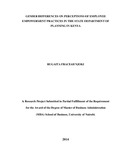| dc.description.abstract | Empowerment practices are managerial strategies adopted by organizations to improve productivity, increase customer satisfaction, and enhance competitive advantage. The need for empowering both genders in private and public organizations has been necessitated by increased level knowledge and understanding, increased awareness of their rights and privilege leading to demands of equal opportunities and increased customers demands. Empowerment practices helps employees to participate in decision making, break stagnant mindset to risk and try new idea; decide on how to solve a problem rather than wait for supervisors. The objective of this study was to establish the differences in gender perceptions of employee empowerment practices at the State Department of Planning. A descriptive research survey was adopted for the study. The target population of the study consisted of 698(six hundred ninety eight) staff members from all cadres within the State Department of planning . A random sample size of 72 (seventy two) representing male and female employees was drawn from staff within the headquarters. This study employed descriptive statistical data analysis to analyze the data obtained. The study concluded that the respondents had divided opinion on whether empowerment practices in their department creates a work environment which helps them to foster the ability and desire to feel and act empowered. This study therefore recommends that state department of planning should provide a good working environment and equal empowerment opportunities which helps their employees to foster the ability and feel empowered. On perception on job training, the study concludes that the respondents had a divided opinion on whether training programmes consider all genders provided by the department. This study therefore recommends that gender sensitive training programmes should be put in place to enable both genders perceive training programmes as empowering. Finally this study recommends that the State Department of planning understands gender differences in the empowerment practices and puts in place equal empowerment opportunities for all employees. | en_US |

